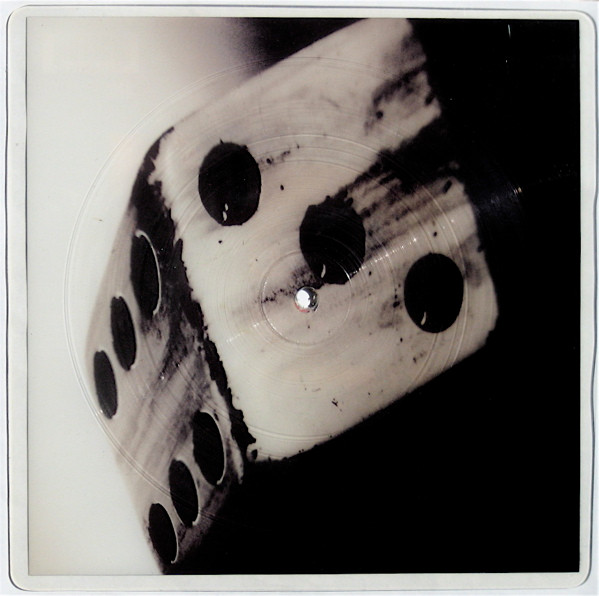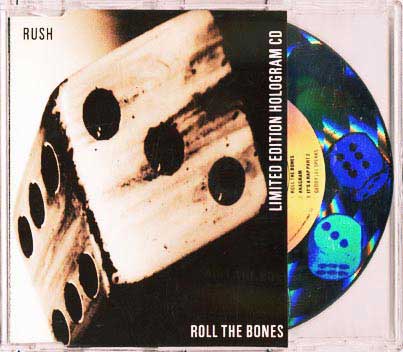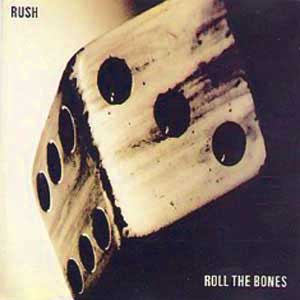"It's a Rap"
Anthem Records, February 1992, transcribed by Paul Stone
"It's a Rap" is a three part interview (one per member of Rush) which is biographical in nature and overdubbed on the song "Roll the Bones". The interview segments were taken from the "Roll The Bones Radio Special", released by Anthem Records to radio stations in 1991. Released on three special edition UK singles in support of the Roll the Bones tour, two were hologram cds, and the third was offered on vinyl as both a 7" standard and 8" picture disk.
It's A Rap Part 1, Alex Lifeson Speaks

"It's just as much fun as it ever has been in the best of times. And then when we started working on this record, that enthusiasm carried over and it was really then that we started to think in a much longer term. Rather than record to record, we were thinking three, four, five records into the future and that exciting for us. It's been a really long time but we've learned over the past year or so, that touring can still be fun if it's done properly and you have the right attitude about it. And recording was never really a problem. We always enjoyed recording; but we're becoming more efficient at that and we're enjoying it more because of that. You know, we're better prepared and we're taking a slightly more laid back, easy attitude about it, rather than being so microscopic and meticulous about the placement of every single note and beat - just kind of kicking back a bit and letting the feel come through and if it's not as perfect and exact as maybe our approach has been in the past then it doesn't really matter anymore. You sit back and listen to it, and really when it comes down to it, someone who is listening to a record is not going to really notice those things. And the approach with this one (and it's evidenced in the fact that we did all our recording in two weeks, rather than two and a half months) that this attitude is a much better attitude and you still get the results and you still have fun and you feel more up through the whole process of recording. It really is a really concentrated, exhausting thing to do.
"We went into this record with that attitude and again Rupert stressed that he felt that this was an important thing -- that the vibe was there, and the feel was there, so you know don't get so caught up in the recording. I mean he was up for taking anything from the guides and using it on the record. And I mean they were just recorded on a small 8 track portable recorder, just a couple of steps up from a cassette player. So that didn't matter to him, it was really the feel and I think we locked into that.
"With Presto, we decided that the guitar was going to play a more predominant role again and that the keyboards were going to go on second and it was going to be fuller enhancements for the coloring of the song rather than to play a major fanatic role and even more so with Roll The Bones so the guitar comes up a little bit more and I think this is probably a direction that we'll continue because I think we've realized that the core of the band is drums, bass and guitar and that's really what the important elements are and that's really that should be developed. Feels better to me and it's the same for the other guys. They all say the same thing. Having a guitar up there, I mean there's just so much emotion in that instrument and you know, you play off that, everybody plays off that and it really has to be in that role.
"We did an interview not too long ago with a guy from a magazine and at the end of the interview, he asked if we wouldn't mind signing some records. We said 'yeah sure' and grabbed some album jackets that he had: Hemispheres and you know, some older stuff and we asked 'who's it for' and he says 'oh it's for my father, he's one of your biggest fans' and I thought 'oh, no! It's for his father, Oh' you know, it's been a long time!"
It's A Rap Part 2, Geddy Lee Speaks

"I don't know how we got this image, maybe we wore too many robes in the '70s; but they have this super-serious image of us and that's so far from what our relationship is. I mean, because a sense of humour is really one of the strongest part of our relationship. If things aren't going good, you know one of us is going to start cracking a joke about something and I think you have to be. We really don't take ourselves seriously as people. We take what we do seriously, but there's a time for being serious and I think that people that say there isn't are kidding themselves. You know I'm spending a lot of time out of my life to do this -- that's serious, you know to give up that much of your life for any kind of work, you've got to feel like the work is worthwhile. It's fun to have a laugh and we do have a good time doing it, but there's also a side of it that you do have to say to yourself this is meaningful. This justifies the amount of time spent on it. Because time is the most precious commodity there is.
"I don't really know what's going to happen record to record in terms of complexity or texturally or whatever, but I think you have to allow yourself the kind of scope and the opportunity to be influenced by certain things whether good or bad and we allowed ourselves to be influenced by synthesizers and that kind of orchestration and it was a fascinating time and I think we did some really interesting things with that but at a certain point you go 'time for a change again, I feel like I'm a slave to this equipment, I'm not really enjoying the way I'm using it, I feel like I'm a little bit trapped by it' so whether it's less or more or just a reaction to all that technology, it was important for us to streamline and get back to some kind of organic style of writing that seemed to be more expressive and less demanding texturally. I think the reason that we still are together is because we sit down and when we sit down to write a record, stuff starts coming out and we get excited about that and that is the reason that that writing is so enjoyable for us because there is this creative spark that we have with each other and a remarkably similar musical direction.
"We've always maintained that any idea, regardless of how different stylistically it is, is still valid if everybody likes it. If we wanna do it -- let's all do it. So there's never been this great hidden desire to or this frustration of where 'I can't do this in the context of the band and what I really want to do is I have to do on my own' It doesn't exist here. Cause what you really want to do, you can do in this band. So that's really helped that out a lot."
It's A Rap Part 3, Neil Peart Speaks

"Roll the bones is the perfect title because through all the thoughts that I go through on the album about all these nasty things that happen and all these terrible things that could happen to you -- a drunk in a stolen car could run over you on the way home tomorrow night and you can have the best laid plans in the world for what you want to do, but there's still that element of chance that it could all go wrong. But the bottom line of that is to take the chance, roll the bones, if it's a random universe and that's terrifying and it makes you neurotic and everything, never mind. you really have to take the chance or else NOTHING's going to happen. The bad thing might not happen, but the good thing won't either so that's really the only chance you have.
"I would say as many lyrical ideas come from conversation or a tv or just some little twist of phrase that I like and write down so that by the time I start to write lyrics I have pages and pages of these little jottings, and some of them don't make any sense to me anymore, but there they are. Roll the bones is the perfect example. That phrase has been in my notebook for at least ten years just waiting to find a home, and finally, this time I had the theme of chance and I thought 'yes, just roll the bones -- perfect' So it came out but still I have ideas in my book still that are even older than that that are still waiting to find a home so again the discipline comes in just forcing yourself to write it down. A lot of times it's very inconvenient if you've got your arms full of suitcases and stuff or if you're just about to go to sleep -- there's that classic moment between waking and sleeping when everybody knows a lot of things go through your head and it takes enormous discipline if you're really tired to get up and jot something down. You'll say 'oh I'll remember it in the morning' but of course don't. So that's the discipline factor of it. So inspiration isn't really so much to do with it. As it is, I can sit down on the first day of lyric writing and go through pages and pages of stuff and see what connects it becomes just craftsmanship then and having the patience to sit there for three days looking at a sheet of paper that you don't really believe in sometimes. Quite a few songs on this... Dreamline, the opening track was the first one I think I started working on months before we started working together. And I just didn't believe in it at all but something kept compelling me to keep going and I knew I was all lost in this imagery and I couldn't get everything to go together and I thought it was just garbage and I sat for the first three days working on it, but I didn't believe in it. I thought 'It's junk'. Every day i would read over it and say 'it's junk' but at the end of it I came up with something that was satisfying.
"I was hearing some of the better rap writers among whom I would include LL Cool J or Public Enemy - musicality apart, just as writers, it was just really interesting and it struck me, it must be a lot of fun to do that, all of those internal rhymes, and all that word play and everything, which...that's meat and potatoes for a lyricist - stuff you love to do and you can seldom get away with being so cute in a rock song.
"So I thought 'well I'll give it a try' and I submitted the song 'Roll the Bones' without that section to the other guys and got them to like it and said 'well I have this other thing I've been working on, see what you think' not knowing how they would respond, but I'd had the fun in doing it and I'd been rejected before. My notebook is full of things that haven't made it too so that was the situation there and they got excited about the idea; but then 'how to treat it' was the other question and we did think about getting a real rapper in to do it and we even experimented with female voices and ultimately found that that treated version of Geddy's voice was the most satisfying at creating the persona that we were trying to get across, and was also the most satisfying to listen to. With the female voice in it, it wasn't as nice texturally going by. Whereas Geddy's voice treated like that became a nice low frequency sound and you could listen to it just as a musical passage without having to let the song go by you and it was pleasant to the ears, so I think that was one of the big factors in choosing that. We'd even been in contact with people like Robbie Robertson. We thought we'd like to try his voice on it and contacted his office and so on, and John Cleese we thought of, we were going to do it as a joke version -- get John Cleese in 'Jack, Relax' you know: get him to camp it up, but again, from the musicality and longevity factor, that would have gotten tired quickly. That's the trouble with jokes."